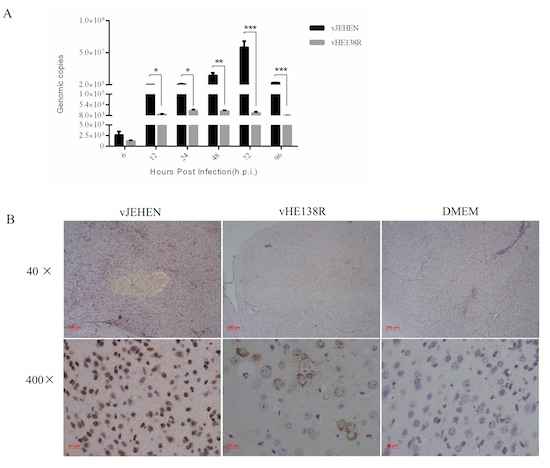SHVRI Finds that the Acidity/alkalinity Properties of the Residue 138 of E Protein Determine the Virulence of Japanese Encephalitis Virus
Recently, the research team of swine viral reproductive failure syndrome from Shanghai Veterinary Research Institute of Chinese Academy of Agricultural Sciences (CAAS) has made important progress in the research of neurovirulence of Japanese encephalitis virus (JEV). It was found that the acidity/alkalinity properties of the residue 138 of E protein determine the virulence of the virus. Relevant research results were published in the Journal of Virology. Dr. Tong Guangzhi is the corresponding author of this article.
Japanese encephalitis virus (JEV) is an important pathogen of viral encephalitis, which is prevalent in East Asia, South Asia and Southeast Asia, and seriously endangers human health. People, especially children under the age of 14, have a mortality rate of 20%-30% of Japanese encehpalitis, and up to 50% of the survivors have encephalitis neurosequelae. China is the main epidemic area of JEV, although the Japanese encephalitis vaccine is widely vaccinated, there are still thousands of cases every year. JEV is also a natural zoonotic pathogen, transmitted by mosquitoes, and infects horses, wild water birds and pigs in addition to human beings. Pigs can be infected regardless of size, high level and long duration of viremia play a major role in the spread of JEV. JEV infection in pregnant sows can cause miscarriage and lead to a significant loss to the pig industry. Therefore, the study and control of JEV in pigs is not only of great public health significance, but also of great economic significance.
E protein is the major glycoprotein of JEV, which is responsible for the adsorption and invasion of viruses. Mutations in some amino acid sites on the E protein can alter the virulence of the virus. However, the characteristics and mechanisms of E protein mutation change virus virulence are not very clear. Based on the reverse genetics of JEV strains, the team confirmed that the 138 amino acid residues of E protein (E138) determined the neurovirulence of JEV. The site-directed mutagenesis showed that the acid and base properties of the E138 residues determined the virulence of JEV. The virulence of strain with strong acidic amino acids in E138 was strong, weak acidic amino acids in E138 was partly decreased, while the virulence of strains with strong basic amino acids in E138 was weak. There was no difference between the strong and weak strains in the ability of adsorbing nerve cells and non-nerve cells, but the strong strain can diffuse in the brain, while the weak strain lost this ability and could only infect limited cells.
The study showed that E138 was not only a variable site, but also an important determinant of JEV neurovirulence. The acidity and alkalinity of E138 determined the virulence of JEV, could be used as an important marker for screening and identification of strong virulent and attenuated strains, and also be a target site for monitoring the virulence return of JEV vaccine with E138 mutation. More details are available on the bellow links:
https://jvi.asm.org/content/jvi/early/2018/08/24/JVI.00108-18.full.pdf

By Zheng Hao
haozheng@shvri.ac.cn
-
 Apr 18, 2024Opening Ceremony of the Training Workshop on Wheat Head Scab Resistance Breeding and Pest Control in Africa Held in CAAS
Apr 18, 2024Opening Ceremony of the Training Workshop on Wheat Head Scab Resistance Breeding and Pest Control in Africa Held in CAAS -
 Apr 03, 2024IPPCAAS Co-organized the Training Workshop on Management and Application of Biopesticides in Nepal
Apr 03, 2024IPPCAAS Co-organized the Training Workshop on Management and Application of Biopesticides in Nepal -
 Mar 28, 2024Delegation from the School of Agriculture and Food Science of University College Dublin, Ireland Visit to IAS, CAAS
Mar 28, 2024Delegation from the School of Agriculture and Food Science of University College Dublin, Ireland Visit to IAS, CAAS -
 Mar 25, 2024Director of World Food Prize Foundation visited GSCAAS
Mar 25, 2024Director of World Food Prize Foundation visited GSCAAS -
 Mar 20, 2024Institute of Crop Sciences (ICS) and Syngenta Group Global Seeds Advance Collaborative Research in the Seed Industry
Mar 20, 2024Institute of Crop Sciences (ICS) and Syngenta Group Global Seeds Advance Collaborative Research in the Seed Industry
